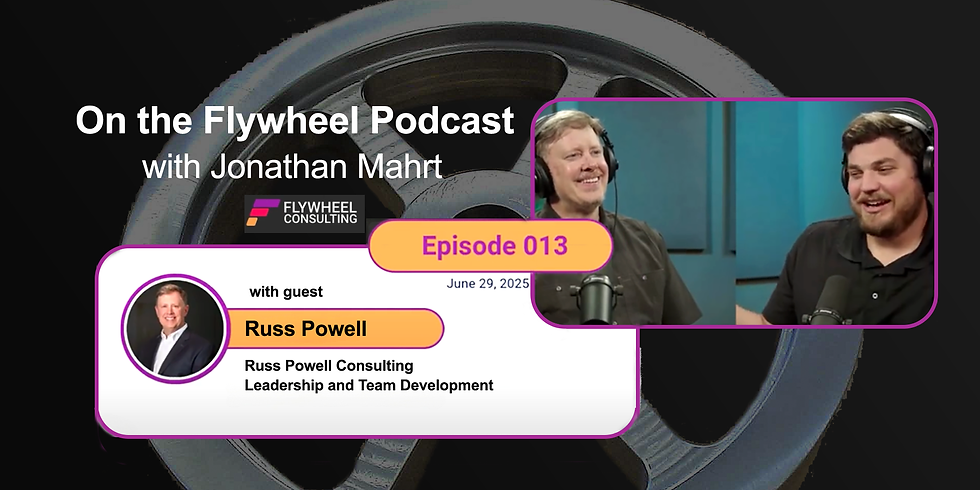Three Leadership Lessons from My Conversation with Jonathan Mahrt
- Russ Powell

- Jul 22, 2025
- 3 min read
Updated: Jul 28, 2025

A few weeks ago, I joined Jonathan Mahrt on his On The Flywheel podcast. Jonathan has a knack for asking thoughtful questions that make you pause, think, and examine the core of your work.
Our conversation covered leadership, problem-solving, and even poetry. I left the recording reminded of what I find most rewarding: helping managers and their teams become better problem solvers.
Below are three takeaways that every startup leader (and really, any leader) can put to work immediately.
1. Leadership Is Primarily About Problem-Solving
Many startup managers excel at building products or systems—but when faced with the messy, human side of leadership, they can get stuck.
That’s where I come in.
As I told Jonathan:
"Everything I do is in the service of helping managers become better problem solvers. People leave my workshops and say, 'Russ helped me learn to communicate better.’ Yes— and it’s always, always in the service of solving problems.”
Technical brilliance doesn't matter if a team can’t solve problems together. Communication, trust, and collaboration aren’t “soft skills.” They’re foundational skills—mission-critical for business performance.
2. Forget the 17-Step Leadership Model
Leadership doesn’t have to be complicated. The most effective principles are often simple.
“One of the things I love about the models I teach is that they’re all very simple. No 17-step models to having a better conversation. Did I remember step 13? I don’t know—but I can remember this.”
In my work, I rely on frameworks that leaders can use in real-time—tools like the It-We-I model, which helps leaders view challenges through three lenses:
It: The structural—roles, goals, processes, tools and technology.
We: The interpersonal—relationships, trust, and alignment.
I: The intrapersonal—individuals and their knowledge, skills, abilities, mental models, and biases.
The beauty of simple models is that they stick. If you can remember these three—and keep them in balance—you’re already ahead.
3. Courage Sits at the Center of Leadership
Each morning, I remind myself of this with a few lines from a favorite poem by John O'Donohue:
“May I have the courage today
to live the life that I would love
to postpone my dream no longer
but do at last what I came here for
and waste my heart on fear no more.”
Leadership is not for the faint of heart. It takes courage—courage to set ego aside and listen first, to stay grounded in integrity rather than panic, and to balance short-term pressures with a long-term vision. I propose that the best leaders find a middle path between extremes: pairing courage with humility, outcomes with values, and decisive action with the wisdom to step back and empower others.
Listen to the Full Conversation
These are just a few highlights. Jonathan and I covered much more, and I encourage you to hear the full conversation.
If you find value in the conversation, do Jonathan a favor—hit “like” on the episode or share it with a colleague who might benefit. A simple like helps boost visibility so more people discover his work. He’s doing something worth supporting.
Next Step
Which of these ideas resonates most with your leadership journey? And what’s one action you can take this week to strengthen your team’s problem-solving muscles?
If you want to explore these concepts in practice, join me for Leadership and the Middle Path, our foundational workshop. We’ll dive into practical tools like It-We-I and build collaborative problem-solving skills that help you and your team move the needle where it matters.
Better problem-solving. Less friction. Stronger performance.
If you lead—or work with—a team in a growing startup or small business, you know how quickly misalignment and stalled decisions can slow progress. Leadership and the Middle Path is our foundational workshop designed to build the collaborative problem-solving skills your team needs to move faster, work better together, and stay focused on what matters most.
Battle-tested in over 150 startups and Fortune 100 companies, this highly practical course helps teams reduce friction, save time, and perform at their best. Created by world-class OD expert Chris Holmberg, it’s the cornerstone of our leadership development curriculum—and a game-changer for teams ready to level up.
Join us for the next session—we'd love to have you there.
Leadership selection is one of the highest-stakes decisions any organization makes.
Hogan assessments offer scientifically validated insight into how a candidate is likely to lead, perform, and derail. As a certified Hogan coach, I partner with executive teams and search firms to bring that insight into sharp focus—so you can hire with confidence and avoid costly missteps. I also support clients who use Hogan to accelerate leadership development across their teams.
If you're incorporating Hogan into your selection or development process—or want to—I'd be glad to help you get it right.
Contact me today.









Comments